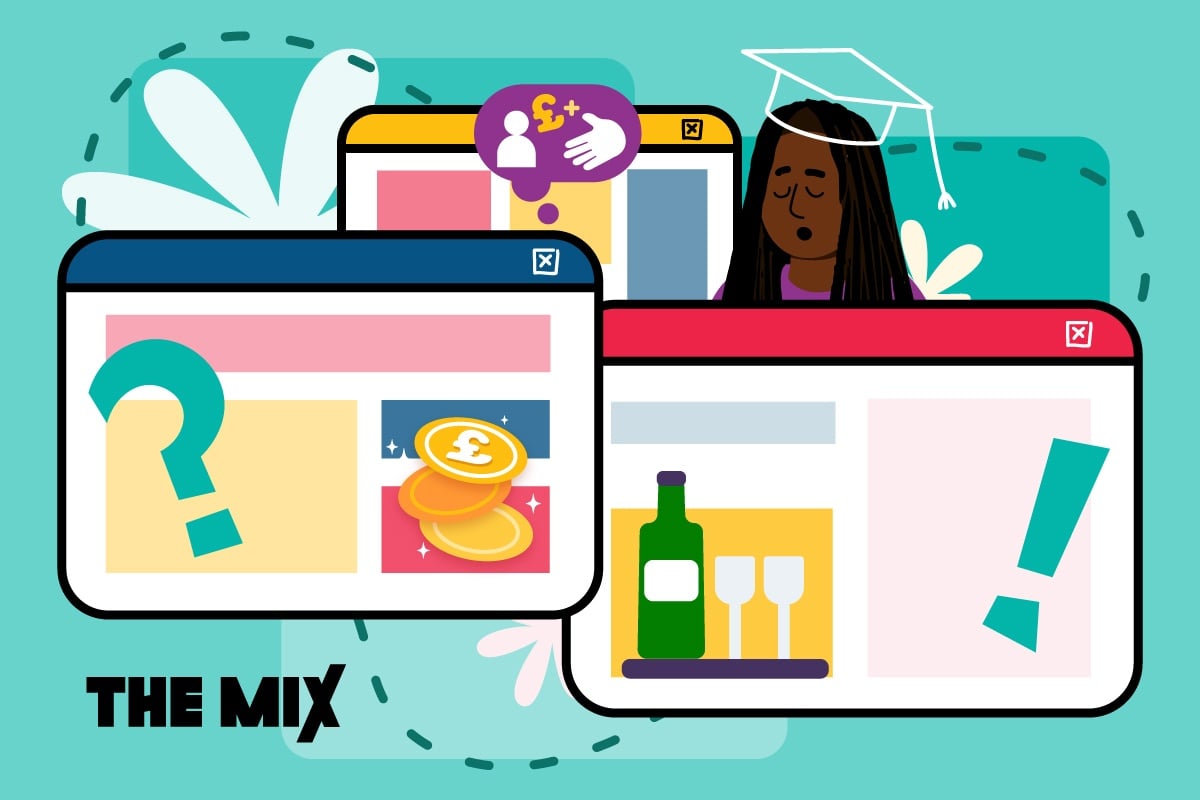Jobhunting after university
So you've recently graduated and now it's time for the big job hunt. However, perhaps it's not going the way you expected. If this sounds familiar then you're not alone. The Mix volunteer Catalina shares her recent experiences on the challenges of finding work after university.

Hi! I’m Catalina, and I graduated university in 2023. I believe young people’s voices should be heard, and it feels amazing to do that through volunteering with The Mix!
My experience of dealing with unemployment after graduating from university
For me, the months after finishing my last year of university were emotionally tough. I don’t mean to discourage you from applying to jobs, but rather share my experience because I know many other people are going through similar situations.
Here are some of the challenges I encountered after graduation:
Facing the “real world”
Job hunting after graduating from university can be scary and intimidating. You’re suddenly thrown out into the “real” world, expected to have your life figured out. It’s okay to grieve your student years, to be happy it’s over, or to be confused. I believe there’s no such thing as feeling the “right” emotion(s) after graduating.
Lacking experience
You’ve probably heard of the unreasonable requirements of 1-2 years of experience for internships and entry-level jobs. The job market is tough and unrealistic.
Despite being actively involved in different field-related activities, those were still not considered enough experience. I had multiple moments when I thought that all my involvement was for nothing.
Writing a CV
Yes, I did tailor my CV and cover letter to the jobs I was applying for. I did include keywords that were in the job description. I did email people and companies.
So much time and effort went into trying to perfect them for every job, and even though I was doing all the “right” things, I felt like I was getting nowhere.
Eventually, I found myself applying to jobs I had no interest in, just hoping to secure something.
Mental health challenges
It took me 6 months to find a job. Six months in which I was actively looking, applying, and tailoring my CV. Six months in which my mental health, especially my self-esteem, seemed to get lower and lower with every rejection or lack of response.
Each day brought a whirlwind of emotions and thoughts, leaving me feeling overwhelmed, ready to give up and run away from everything because I didn’t know what else to do. I was lucky enough for my counselling sessions to fall right into the period I needed them the most.
Comparison
Another difficulty was the constant comparison to others. Seeing my course mates secure jobs or go onto master’s while I sat in bed comparing my life to theirs was disheartening.
In those moments I felt like it was my fault for not doing enough, that I was naïve for thinking that there would be a silver lining to all of this. Looking back, it was not me who was in the wrong, but the unrealistic job market expectations.
Interviews
Interviews were nerve-wracking for me. As someone who isn’t naturally confident or extroverted, I often found myself forgetting questions halfway through because I was so anxious.
I had times when I made up my own answer, unrelated or far from their question. Even if I would always prepare and have answers rehearsed, sometimes, my mind would go blank and forget everything. Each mistake only added to my stress, making it even harder to continue the interview.
Other people’s advice
While I’m aware that friends and family were trying to be supportive during this time, sometimes, their advice would make me feel like they think I’m foolish for not knowing what to do. This was especially the case when people older than me would give advice even though our life experiences, interests, and circumstances were very different.
I wish people would’ve asked me if I needed advice or emotional support, before delving right into the former.
Looking for a place to live
Being unemployed made looking for housing nearly impossible. On top of job rejections, I was denied viewings, overlooked, informed that paying rent in advance wouldn’t work, and told I couldn’t qualify for help with housing.
Just one week before my student accommodation tenancy was ending, someone let me temporarily stay with them. While grateful, if I had a choice, I would not have said yes.
Being an international student
Moving to a different country for your studies or work often comes with the expectation that you will live a better life. My family put a lot of pressure on me to find a good job and make something of myself. In a way, it made me feel like I had to prove to them that staying here was the right decision.
Finding coping mechanisms
An important step for me was acknowledging that I was struggling. Thankfully, my counselling sessions fell right into the period I needed them the most.
I tried going on walks to a few different parks, discovering new parts of the city, creating a daily routine, volunteering, and making plans for future outings to have something to look forward to. I even went to a concert by myself, which was pretty fun!
Final thoughts
Maybe some things do happen for a reason. Although I’m lucky to now have a job I enjoy, I can’t diminish the difficult months that led me there. Unfortunately, I know that not everyone has a happy ending.
My experience might be different from yours, but if there’s one message I can leave you with is that you’re not alone. There are so many other people in similar situations, even though you may not know them personally.
Useful resources
Next Steps
- Chat about this subject on our Discussion Boards.
By
Updated on 14-Jun-2024
Sorry, comments closed
No featured article














